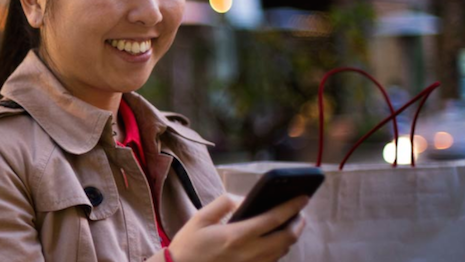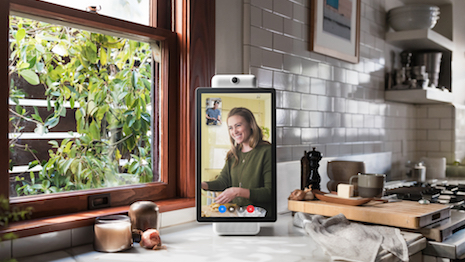Social network Facebook has introduced a new series of video communication devices amid growing scrutiny over privacy and data concerns.
Facebook's Portal and Portal+ are now available for preorder and aim to make video chatting more streamlined with the use of artificial intelligence, similarly to how Amazon's Alexa has changed the voice technology industry. However, the product launch comes on the heels of Facebook's admittance that hackers accessed the names and contact details for about 30 million users.
"Video is where the focus should be, both pre-recorded and live," said Michael Price, senior director of social media at iProspect. "Contrary to popular belief, I don’t think the end game with Facebook Portal is further data.
"I think the long-term vision is for Facebook Portal to be Facebook’s entry into redefining home entertainment and live interaction on a larger screen," he said. "The thing to remember about Facebook is that its mission is 'to give people the power to build community and bring the world closer together.'
"Facebook Portal checks that box perfectly, by bringing family and friends into each other’s living rooms, dining rooms and kitchens."
Smart displays
With the Portal suite, Facebook is competing with technology titans Amazon and Google and their own smart displays. All of their offerings are voice-activated, with the Portal and Amazon Echo Show integrating with Alexa and Google Home Hub using Google Voice Assistant.
While luxury brands from St. Regis to Moët Hennessy are already using Alexa's voice technology and search in various capacities, what sets apart the Portal is its video capabilities and integration with Facebook Messenger.
"Amazon needs cross-channel adoption and Facebook needs voice assistance capabilities," Mr. Price said. "Regarding impact, I think Facebook’s roots in AI and AR are a big leap forward that will push the Amazon Echo to evolve its capabilities as well."
Facebok post announcing Portal
Using AI, the Portal can follow speakers and zoom in and out during video chats without users having to worry about framing themselves. Another hands-free feature, dubbed Smart Sound, will reduce background noise for better audio quality.
If successful, the Portal will also have a large impact on Facebook Watch and live video.
As Facebook has struggled over the past few years to nail down a consistent video strategy, Facebook Watch may be the latest one of the company’s video endeavors to boost luxury brands’ social presence (see story).
"Fourteen years ago, social media almost exclusively involved the exchange of text, then it evolved to images, then video and now live video," Mr. Price said. "The only thing missing is a larger screen empowered by interactivity and user-generated content.
"The user-generated content is the key, as Facebook Portal will give advertisers yet another 'placement' to reach consumers, as well as another place for content creators to monetize their content," he said.

Facebook Messenger could contribute to the Portal's success. Image credit: Facebook
Another advantage for the Portal is that it relies on Facebook's popular Messenger application.
Facebook Messenger is the clear winning platform for B2C communication capability, causing 81 percent of brands to have a presence on the application, according to L2’s Social Platforms; Messaging Insight Report. However, only 50 percent of brands reply to consumers within the hour and only 10 percent have chatbots (see story).
To preempt privacy concerns, Facebook allows users to delete the Portal's voice history and encrypts video calls. The company also does not intend for the camera to use facial recognition for identification purposes.
Facebook and luxury
When it comes to technology, luxury brands should not be afraid of taking risks, as those that stand out will be the brands that last.
During a fireside chat with Luxury Daily editor in chief Mickey Alam Khan at the Luxury Marketing Forum on Sept. 26, Facebook’s head of luxury noted that storied houses have generally come a long way in digital marketing in a matter of a few years, but they are still undergoing a shift from their expertise in traditional media to newer formats.
Facebook is focusing on messaging as a one-to-one platform, including peer-to-peer connections and brand-consumer interactions. In countries where SMS is expensive, Facebook’s WhatsApp is used more, whereas markets with more accessible texting tend to favor Facebook Messenger (see story).
Besides the Portal's AI, Facebook is also leaning into virtual and augmented reality.
Facebook worked with Dior to build an augmented reality sunglass try-on experience, allowing shoppers to see what they would look like in frames in a virtual format. Balmain is also working with Facebook’s Oculus to live-stream its runway show during Paris Fashion Week.
Earlier this year, Facebook began selling the headsets for $199, looking to open up AR and VR to a greater population of consumers (see story).
The 10-inch Portal is sold at the same price point, while the 15-inch Portal+ has a pivoting display and will retail for $349.
"If Facebook Portal takes off, I can imagine a world in three to five years where Facebook Portal will create a new generation of influencers and content creators with Facebook’s hardware and software seamlessly powering the production of pre-recorded and live video through its AI-powered camera lens," Mr. Price said. "This opens the door for every brand to more easily build their very own media company."
{"ct":"diGgNrcJj0sdcRiIGyHJ1u2W9w8zq9C4q4bDp3orgJgE\/6G8\/dAApcqZZynfBlU+ANveWGMy+PK\/DwEeMvdrrqvGOBTWucYmw9x1aMYfd5WdK4UVmxFJZ5gir6mo+dOrT5N+BLwgfkUmGOdpYErLheBXa7LIO02AW1C5sEyxgSEqn1n1zCXI3Xu3kWMBr\/QWknaEtJCl6cEZD8jEVNLj\/aN4citNDv0HtFTe9Km\/Rn29IjZyNJNkWDW+ZNwl3XT+Cy3BXTRrQQdQudVVQZelXLcCbDdAlxsWvmDTKQbQ63qZZRsWch2BFrWpIWksW\/P2JMdHts3oN9ZMGODasFB89hN+qxNaiIooLrz2A618YtGU4n5xaD2hjfEbMFX1jJA5rYzLku2aHZ7WdvGucJjBhrg95N29YOWlHAQHNIGHJdTm3DP1oXEBqsl9QQECS86O0UqJAwqAvtARaWhIL+WcynIbkpMTptXXaBkGvQx90H2TsO1hc+5X1g40bhhNjSJRaXrqp6rNlVu03DVxnR9rW1p2cQdX36Qsbp8HxXISWDoSUqN5y37aaYWxrCf3novspS0NQONx3WkMbL3i1+\/EQ6fWqq0ogtQK6uwt2Iwk\/ctFDPQtECt4bCp5\/0pCS0PhhYhSNbDDNjbWA2GCkCN\/nNSrDMrQoVViKK9w2t8KBq3j9jdoX1Wfi6rNPYgepFYHSoLWkAQvdGd1yRMbNwCKyrw5tpbD2HHa2oco0XbGt0oAYTG2TNngIhumkUFr3WWSua+KJxktQl\/XFhQZ9Q+mxeez26mSqTzXPgDp8DwQlmeHtaL6mTva7O83HBC4w2Mx2Zwage8sV5Voyr6yLfLS5hyC7hZpAVntl2JazgmLjOAnGdJfWl5Pg5smj9V4BDSYkshVkcpkmx\/yE4DFjbYerz6jMDqcW6RehU+JjhPeyUqE4wqIT5kVVKDlvxK1nlluqRY8hgijIkxg3sIZKUp1z92T97dHfaVNug\/uYllWEuDwqk3BaNWr7vKX+60eOJ\/Mec23QIZMor36BTYbi0sFjFLmcvFg\/EHc6BHy9tnQgr3+xUwEPqwon9J4kXd4zCSbqafczdxE9K0dcTunSR39lOHeNuD20vj2ZO2nHpvLVnBfERAhRePmx5kW7UA2g8oDbC\/XdZ7nSM6ft1NbhEd0L\/mgcxZ86gNbN9To5uJjDaIMgRSFUa8n4hbUvwtJtJmKzk20zvlWZmqB42bSxtzSlEHVCa0GCUV6k7K1SCIHoLHzHY\/cPwx0N4ygtQMAs+vXfDcjkBKaaYPHuhndq3osaXwUnd47j1PA41jlfzLBcs+jfWnfPnfCAo0Ajrf0v\/RUEPHjCOUJ2sssck5odNKiG81hekk\/z4ZdSIq9cdekcJYMRrH2bNJat8N3BgRBGprBea+rgg1b5WKXENAxjY6gGZdIrEddhEqt6XWDdYZKln+Fq8Fe+ke5vcOESBaxL7Qd6WHrZ3XfoQ2MVUYmEfMBY\/JY5RxZz0BydxGPddbgYKYjP322swEj79aWa7OZy7wk60Rp426au5WZ1Kc5zqZasSFxXIiiDypmraXLujxgjC9EOUnGFUmizD1\/UvP9dMv9dzGWGTrUFWS\/c3QbLzxNI7eeUnliPzQN8g0LXKBlGIuKdk2mlAc+NUJBWHoBqz8IcqdRv6kBwsIX8GSq2yw9kG\/eU8DF8ey9pdTr\/rA\/cp4i5hxCQKlrE4GfE0YzaSE8iQMng0LOU\/zgIDu8dLCc2yxFFeKDFIzz+qqTnKsWytDYMkS3UJTUL6SIGl9UxTsvKduBSvdqu4IOa1m5\/BEqrtXutLbOMdX6L4X1zxIzLdH6xn7rBAUV8\/YUhDG3Ld6FcydaktV7HrPwECHYXrcwqyNUjua2KazXws8PNLtENILOWt0rF4VBS8W2vQEsvIZehkvKXEVo\/F9LLsLojIyJZqU9+dmzR6Hw2dekYgIs8zk9VwK6Z0yxEpfupLdMkn2iRolVZ4LNtZOTtGUi7BBhmKkGf8z96uLQ1gsOr6DHpDzrYn1Rgq+vU9eb0OFP0Lvwb2nkPOTq7yff4A3ixgV\/L+bEygLi8tKUWAnlM\/4XjU556CBi0uB7BzFoNfY4KPOss8Er9WUyCQ\/Hwc0AN1+\/xJCtKLX1kUWBzylH94U+3P7MlqaiUKatDAVRZOpUBFGbdCmtbaJZo\/n+8ScUE+Kq4sMk5PHN3wkuzjdVt0aAZr2CgyeDyhM6rJLFYaoF4zw\/zP60+m5P\/wIT5u6hjfK+HMDANzQMlWsADXnCFx\/wEYMuFLFxZ7sz9muBKr24d8hcP5T+SCgT3DrIKbbFOkp66H2cMzpmMxKDtqVA5kypHKC2sGgT9mECMKFYWedpDHC9mJmzcORh5jkDDKEtsVTq\/B+G+a8D3HwdM4fa1BL+L4Y79urp3QTlZg89gO33CUQ8m0sy0iGmDrJshbnVTyohH6NnB6X3zdfxHggvCP70xZY\/2EHu+cZcEgpslBR9Gmwb4j1zR6dfR6+I4d8HBYjhxJVMaG8QhkROvmcS5IFcc498FjnrEJkxlXnF\/kzqQNzHe6q4WRVuNKswH1uqAqvPABq7ub3M4F\/Y842hTobMoHihaesgfKSG\/f3Iyk5sOZdWSJi75S3UhfkVlPNQbGBzHoCzI1PB0MUnx8+CcOzwPkDqj2WpvXW5juWnFYFKJQmEYDSi08S1MzNJTZjzLlykbWYVjaYK\/h\/q0ok\/gna6hkOyEgdJt97Cd6grx8H8HMSOgbZhipa427rsU14eZoyHpssFX0C\/wypZbpTOsYGjfY5LZaX4fYP9HXab9z7q5Gcyy1LvzHN2vUKXWF0iV0G7fiaHqrR1564bDtfti5eYae\/zCNI56uyrYJmxkgekCshtWxWBrFdgQYFnARU7zaaSDy6wG7nHAh\/Hns97p3uVRYWT3YaYYs5h\/yUGi96E54+jIe4iZwHPdB9CmkMJ+GCSSLJBkV94tm7MlV0PGBn\/RKr3LA3K+J8rQB+oNz703qLDjNIvl+arH8s+J\/FW79KSWGzH4hIsN9ezidpmnuizq2Iuq3YT21VW\/Ef05UA3rQNF7E+VI3S2lFotPEQtx4LMdQl3k3jNai8L0olaMTZt1qk98\/WmhwhFeyS01xqhRpXW57asl3Ics34T1k40cski+OSowUKoEyW15uHcXV1opQt8+lSSrrT0CLhfo7yxV1WuTje\/CZD+GTSPBaIxNHQUhzyy7mWD8z7uRlGLbwRW1HgBWE8fQBwDcBIW5rhd7tC+AbgpmzP5d45TgqhWMGVghMcLrQa91LNThGh78zYG6avAiZrutwDRLDuqrnPjMpzFvy2V19ljOjfVTk59E4Za5q9eeqmjLt1vkUqKAa9IRA5IMTW3vuK+n9uMMb2vmej+T68MyYWMVyvnRwIhubAmRCUPT2Q9oBPlFuNgLrLjOURN7KM60VToIvroie\/ZxryOiZH5N8r54q4IQxCWpeNDN0WFlzZkFysBsf9IpxMCukMtyGtHyWu\/heP8p1CrGMGEu9JcZUI8\/FnNiVpAbBSsw0TBb8Gv1gfUiGYzoPa1MN+UTu47wbYOy\/EYxagPKmncGlNpCCKJ8C9pmi596kVWYCTTrimOYZ4gOztMXYjGT0T3cHhQh9azKMOTGLmCFd1gk81Re7alhnZIeY+XEion9uHM+deSvuXaPcspDn5diHMv6NQvsMBWyR4jrGfeMMb9K++guXycOv\/akODk0x2Zfyq9+wHfhKwNHbAkmVFqTsHGuTtetCn988VqPDndr5UMcf6TWR6eJI08mb\/\/\/KJHNkRt0R2a6scroPtTDxjnEpPHv64Gg5Z7DFPfcKexDrZFrFtW\/T5KitPcVn3n9z5W9\/rTrbQFYTc8\/SVvuZ1k5wQj6gT2q32gLRsQfQO7P3yRu3+NyZpeiySVRQpDGJH9126\/5N3v+s0PwdpHLGxJvGZirmlcpUM4vUNizBEh\/IdqqqD6c267pMFPEf4jgfed\/XfvGyB\/4Kt6C\/RRx9TtF0wre7KzP3A3AIc0VCzW8htxdeY92wKumEwPQ+TlypqAIUraWrLmHJz4583P\/CRHNwAQqmi\/y47HCG5XDl7hrWWr6sHVJW5fA4x4mlraIC5ZbWzb0zYPSrWXV+8vmvy226hQJgc+atWLLLoCXPXBDLsVWU3ooBw+860Jap6muxkbxrUzOv+yoDUqpUGWDHTDHXQrLQtVoKayrmWEmrG3Cn9dfp3TIKXxnEEJvWR\/hHZiDN4E3eUoepraI+U1a20Sm46jDj6INgPRPPZKG+w7ShUvZVpZrAkruBbW65y50qBOTB68voVjm5mjVfZMaeJMM0vdKzP1wqRDNM0fkeVqddCaGsWyBJ9yD5thneQec4RnVxYIaEpuw+HcyDXcZK6EjzsID7EpzZTVpkN7CB+o6udXuebefgBJa+nkx0kNeR02QznP8ACniaZvG+Y66bDBEWj+UQUZBZvx4UMEyPIOYLT80ugnGSR1hnWte+6V8Nqq5H+L1nlZujgj2jnWgzD25FuF2v0JvwDkvBAtXQTxzBlPBoMY+OMAdWwPSB06YjXan\/STV+9\/0tEJfbc8BGPfPVCzto1ONzIwXB6voEPBKuHVZ2WAPlwrsErfC\/hIFCd3dpqTJs1\/k64zarUCadPPzUWnfmQNtMEG4cud7aNMw6nWZch2\/0vl2cGeQxu9IOgKECJkLxZmy8+8KjuiwKFrXoH2gsWEy27R6u6r+KK9Oxd5jicZufWi6mDTnCbUWEjmEm3NjcDNrOOIcJu41TMsnmkW2ZeeYa2Y1A1epGocC87jVHhHiyPOQcKmVmEEsy\/zDcwm0IyoKJybtPh97hryRh89s2qu0T2i1iefTzMW7yNUBGgGawzEIqFl2zScVN\/BP+nFPZ2aC+HC0+bQtsFg9esa1meAC9gfVu3BnfrY8fiJDSK7+QSWdU+rStredTjMvDHkcNUuBse\/Tf0nk\/MeKbF81XwEdzErbCVvDePS6EvtT9sm65O\/Y1gpzEJFZyl7hVk7\/QIday\/I2V0RCgEORIagHibqiQK6BFn5ewrU76z6SkndzF80kA3joPMV6t8L+MHWnNkSiqdZ153IUvJjSvTi7zjPb1MhMSZDP4SLsDh+HF+BlPusBhM\/Gs+4sJ95qb1f+DUVTHmSNhJRSJyBHUOLZkFcuu627VwK3MD+kfVp7B3btNQCyUfwgdKmrxMW52kEv9pmx+nCwy9smAfPyo2V24xrVIwPvhMKS9nGaH3vLo76xHdJmNN\/y15a8yBtJviCqWdresmS55CxLFUWSy5uFqGxl8vjdlJKWoyhc+1EwQhIbI0gu6q40zwt+0Zzrvi+aQVhSCYDp4dmhwKRr4J4yx5v+zJ7bqiD8XVwnhxc4wA6sLpPWjjoB9nhbFZDXY0fPWOm83DUuM1yTKUhDD4htdXtkQ3mxnx2SLAH+AdmNmL54iB2cCrny8FLYBYPmNOtA4XrDhtESo7Ed+w12091DPZq482AiLt4CDj2DUbT2db5JBPkuhl6Tc2QkS8SW8m4PnbCGd3Q7RCRvBafpg4nN1ig76CvD6MIb6lABGcJPIs3PFGX\/8LpRCo4pfSLygdV51U98uqF09Btsj8hFxPyFDM2ZEzLz9fbN1B6iGfF0d7zk4tiMmQzJ\/MU+kVgwxx+VKpsciywHInF8tg\/DXtSEg4rLhoTftbwYiyOhS3mZr6YOOGXlHSH1l\/BfDDJdm00URskyCFKdodVd1M7+RFMqUKo\/4sZpXh3+uQl2X+H5wAuWjgy3TiQ5MKZTivn7EKJLwa8CeUo9p2cISJrrCPvvxvTtivGdIpjT2pt2gV1BsfceTsG7YKaWXwfPvnGZIrRl+NYDT2P3z\/zpZAGp9SOctTtorckMfCJo\/ldm19zy7pbvs+9ZtgeOgolN6H3hf2y3\/G9gDJpjE6r0Bhve5e5rxWIbPj2R9Le1Jwcq7pWxV8IbdbJOQ8rOw7O1uJtxp4xy9t2bTlDYAnvYZITrUEWFNMsH9JemREDQWN\/Byn9OhWVGUlWmsasiTaEzhRiCJzlJmbf\/wQ6t6sk\/MAd0DmZpPaLehfGyXnu5+gTDVmRHbCcl1bKDOZTpbE1gq7vXi\/6bdpHvatgEbAWD5uu4Y5Swd40BNq9UglsK3ukNAbndRXK3lzdRv007Pkf3irDrF215bCnDdLbRjXzQAcQkaasOwSzxMGoAN23fo5JHXDq5P2Ezqf67nggZS6ysZR7Jev17yvThSYEN9+CvPb5Ci7VozfXLbc71sOJWPhAQ2uA6JP1x0Y+3Puyo3wmNpJxSRbOF26KygOrxAbhCXHqXRqOQl26U1aKnvUiwjqnpC9WSgjZfSAzKyGyL2nauzVFb6NZLE+xMUP0TdRB+3GSNmKBTA1izDysZXqxoLFGFLklojRKH93NR157WE+S1fQyLYDJ5nbD8IirOXz4aJwzpl0JFE7x4cvZIKOmnnLaO4Dd3EKnwcdKnBwxjH89ynXAuJPtHA\/La06IOuJZCV6qcjBB85XeKmogfOmCeCGVhkwtc0JrDk2eLlhgZdzn6\/emSrsgvDKPdneWe\/nMdLwIigqFb\/CS4XeBBXJd0YHVcn+JV5WKwKjXG6AxTv18RQCAQ\/skZ3Avav5DZm69ozcN0BV9ClWLFltIO50sg8HEZaFE\/d1oGNuR1Z461yFEBi16FJANOQVVwhIro9ReCXXfmJd3ZCl4LvvqHE1UFkGB\/E\/lSsGrg87FPy\/Cp+l\/YaDIiym1ILgozuhvrv1ex0hxNjnjzQJOpYfmX7oZvupUg7\/2yLkS\/xbTBEbWn8sRjQJqT6zXR92\/CRpwEHLxlFpDdukG\/EPqSMzDBe\/9G1JQ6+HcZqbNUfFc9qgJXW3xffSPChiyXVnvIiS0NDlP2VL\/txNjSRxUjdV8BPONbGzBhguITo4Rqt0sqEvesSaPFa1+eq+2r8PsepcYBRR16emUSMLbk7b5uZSee63Y19aUX8rrGhEi+NFXWj8oIwBRSDjmeeV85O5TGwBKP3yK6nuirngiDpuojwCOZHBMfOSB25vw2SLBI\/7Oz\/mhn\/wJKCcwoHphHoqTIIWpcLcgc92duntb80d8VwpUPxgKQXw12ZGPWEBwZ9Pzx0LgFX3E46a+GOL0kKKygVM8UxgcE6slP\/iqGDduyx0ahr6STPiD8nDktRETbT68KJqTBEFAFiL\/oM\/vYkJShWY\/r1F328z4tVSWakNSQBFJBHl48gpBUhlnXycNVgu7saxpchtMDiKYoNN5oLN2L+O8WAk5kmqF\/fv+Acy3tmpH9Z5+9sVtmPDpSVXu1x1U+GZTYvF4TXpcWaWVpvpBqIvyg\/flqDiS6513l78IlMbNFtj2jNBToe7AXpdPwLopK5axgCHCcNKhF\/5A6AMokE72pw8MThSA86zS4ZGJal4e7rTNhNFPUnp+sFVDFSMmndqhiHiRKIx2ua1i36NY4TZD6K5HJU70Z3z1PAoI78I0\/0XOlVhjS1mp1Op\/OAHAz2BZhzCU+gh1KQHDxqP9xBPSNNXSvM8I9neZQhKAKAJ2Bizj7hzLQzVG2WsG2m0gzyAfcUz8GiHbui3wY0FNrOegSs3jrxE69SWZusjcIdKoPw3l\/blpMluFgB5exTM3qoLqQZs9VlPyj99FQ1sdc6Cjpv+tpQ6Kl36GEHC6wSIcxV3UPR5SwpwSfDIlS1aUjllV5RPVmYFACQkeFEOwUh5q49r67BpakdunS5fjt2pgqR7rtvJLYCXpmwTNUAsNynGTJ8BptaXTwbjZ9iH5BYdzWi9P+\/DVg\/mMKeCXgoPo4CpM0xz4jd54oNEY1WndxZd+Xn\/iKS\/\/BA1GBHMv+xgsHF686Pt5UliYrD05s2e7uP49BoHDOUiOxFwvqOGuogB9jrsS8qaT2iAn9MNsoK47WaiDyB0FmZbLtlN4ejkfrIsyN2t75XMJKCG6YfcmkODcer3upGb+8ZgjGcACI\/eUg\/aeakBpgjEXhlElzEy6BevNSXpdgOkDeLuSFOv0dDEwMtgQwaf6eeSUeY44d7JYsVyoXTK1U0Xtwatz+iwYImRQ4dVQ2kGky\/1v9\/kVqGnMWFOwr5Q87lvDd9PzhISvsFABkGl85K0bFYSwzljldScORYavYmoOC688w8y7ZiDY7RcwuDfElWyU5tAT7bBs2Euc2ODvTGdqP6rmnOxrohyF7oKA26H0g+70Zg94cLhjeVpsAtWl53\/Z1ba8pQZOLpV7W5HhvMRus5v5pGhK+QaiDMFhOOSWBHh0WMCBLPmV3r1FytC6VaGH7QRNkAgkugXrz49PDxLopDID3OYGewUIMubNwJg6nEFHfRf3iNldaQHReEPES4dG2elvh1+hftviZwOJrdlEZLOg9\/KzVuss\/8Ldacb+vWwQMp6kupbe81qGP6JkzHpo3U4qaVbJ8tHL\/N3mdBuDrjH5wra7+HzArj23NrIt5DUlpQT\/0gIK2zCKn5W\/wo7fKxdBUWdWA+5MzRS\/2YTOEtdq5oK7Pi7hgvVMv0F43eTlcvU4WyOoBzcyV1lHMwxoonCcv3NU5r7aHlvXg4lHI5M6GTdMcvbr9CIrBfaHa1blUzIZU\/dV90ahApceeXpuIcbt1buYb9Y9QqrL9AYZVTelAfzA8p3F4QBgoz6vLoAmOlzsQ4qIsuRV4f0sgAHCCS3\/SYPLhgcUoZfM+bGJ1rj8GBnXm31rw6OaqAqqaQV3EBw2gmc8T9DTc0C2wyOpHOkjwwdHSzDK2IShvZFN86vJDuim0Mj8jyy17pAjIyjXvl77o+QJpVJLric52e4VS\/riOtVmwr1PuOrPcljVs8oXZpoW+H0PciYAqh7gVlgYbBExJOlxCpXyaaemM8yAujejuwRwVLxidp1fDDhtv+6BBCAXCo4N2a3Cof9DVjcc36fvWLOPcnYfqABVfQTiR\/FbptQ36G4V1h+a8wWk1xkpS+PcWDDRPiprhhV0X\/SVAIv2XQKJD0VzMgATQ6vhZaE34Q\/76GKwdfQvxg2bQis+TdTo8ooLw5cQEcI3EPdIcxCmgFTUCOj4QWAwue5cSgJAFxB4a4wIimo86YslZpS8J582VObKHA6hbCpoyTRkaz8lOk2AZGXyDmsTf4a3gfCD\/Yp5sxBQ59LIi\/AjA2kwdXxi6sq265ajE7f\/Pk5pgI8Z1FQQuMJNFNC5AsJdGPYs8luWjWgEe\/YhwYboZb2rmfpfSd+MmAgZ8+NThYzP3gKmIJta4BdTGQ+G0QcAZmcUbCa\/1H8gecn4xqqk+2e9oc6bDsbtNwhoiQ9dWinIjxo8GJg4wJauMoRPvNEVMS3EC6rkiIA1Aaq6GG\/cW8tYTgcxmhtfkwvdmc\/8pEifvZNE5VTE2mCEujGxuMYhbnhHVIoP61Ze2Hc+IAKcKIpHPSFkO6RuJH6VvrBSJ65s+RsyGkyplOfDcYe5Ylx+Z8rf\/HysV29Y37VqJx83zjK9OC7OkVOmKYheHw3D1fVrG46mnl4WgeIT3NI\/XkKX67oD4xml1jFvz+ybUdCuc38ha\/E8bdE2fdoVcMVDhut6YpDecfQ2hkguHz49DOj1CP1HInuZqrM4aTSZeFG5MpSxevMeMDCQw4zs\/y\/a+4YUuIfLGFDaybSfqhEe9DIHFb9JB+kwkMILsJcVDd6G2eJ6NzgKU8ttDIL8eN\/G4SbzT84Rturraj0HGzF93vuQVYhInysXCrayTRingc6BS28z1E0Rf0Z7F2+9H\/bWwHqPkNbFqme+8Tcly3m+Z\/d0dMBO6B0MHNzQU\/x2CSAdRnfVmOXorfVHDNrUTBjU","iv":"3a1dd17343643b6f55990ef9bf7cf85b","s":"757c3a0a9a6cd4bc"}

 The Portal will integrate with Facebook Messenger for video chatting. Image credit: Facebook
The Portal will integrate with Facebook Messenger for video chatting. Image credit: Facebook